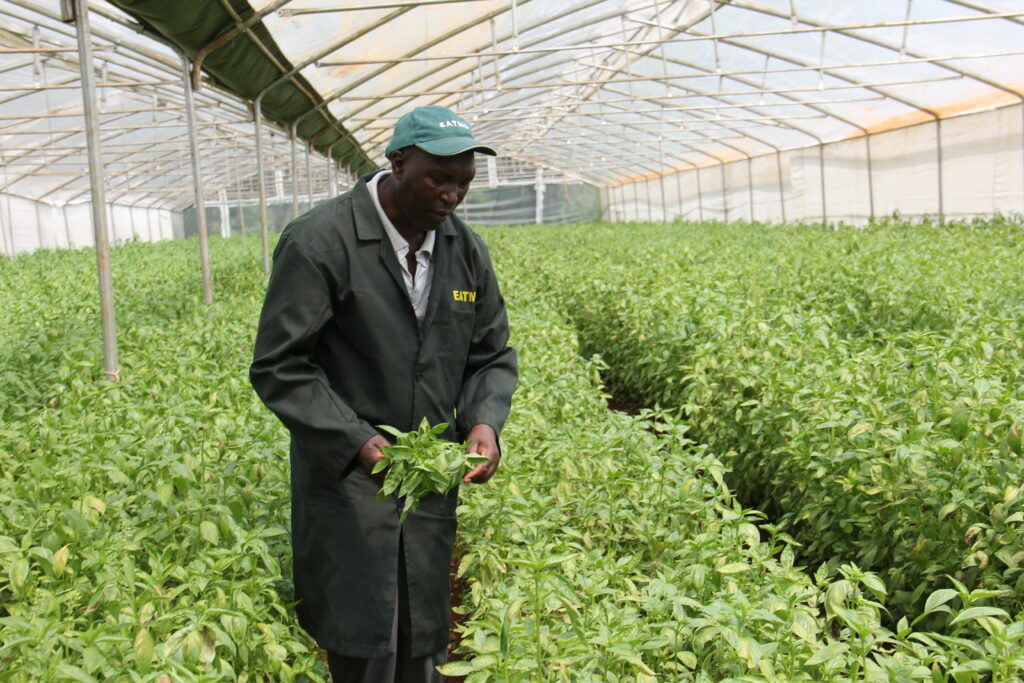
A rich and pleasant aroma welcomes you to a herbal farm at Subukia off the highway to Laikipia. The various herbal crops under cultivation are neatly arranged in attractive rows in six greenhouses.
Inside the greenhouses and sorting sheds, 20 women are busy. Some are harvesting the herbs while others are packaging the produce that is destined for the export market.
The buzz of activity at EATMO Kenya Limited farm within Subukia Sub-County in Nakuru sharply contrasts events here a month ago when a group of 30 workers were laid off due to disruptions caused by Covid-19 pandemic.
Godfrey Wachira, a manager at the farm says though sending workers home was quite disturbing, the proprietors had no choice but to reduce the workforce to five due to Covid-19 economic shocks occasioned by a disruption of international trade and suspension of air transport.
The change of fortunes in the herbal sub sector has been attributed to the fact that some of these crops are known to be useful in producing medication for infections of the upper respiratory system and as well as their wealth in vitamin C.
Already scientists at the Institute of Primate Research (IPR) are testing the efficacy of a herb used by traditional medicine men to find out whether it speeds up recovery from Covid-19 as the search for a cure for the disease intensifies.
Dr Peter Mwethera, a senior research scientist at IPR who helped develop what could be the world’s first HIV killer gel, added that certain herbs had shown promise in slowing down the effects of Covid-19.
The institute, the largest such facility in Africa, will use some of its 250 monkeys for the research.
The herbal farming subsector has also been handed a major lifeline following an increase in cargo flights and the partial reopening of supermarkets in some European countries and the Dutch auction.
Wachira says the subsector’s multibillion potential is severely underexploited in Kenya.
He is optimistic that with an increase in production, more workers who had been sent on unpaid leave will be recalled with hopes that demand for the exports will increase in the coming weeks.
Two greenhouses measuring 45 feet by 8 feet are teeming with basil, a medicinal herbal spice, and two other greenhouses are filled with beautifully sprouting chives. The farm also grows Thyme which is slowly but steadily gaining popularity in Kenya. Each of the green houses has a potential to yield 200kg weekly, worth Sh78, 800.
Wachira observes that herbal farming is a venture that is yet to be exploited, yet it can create employment and provide income, especially for young people.
He says that the farming is simple, requiring less capital and labour intensive and lucrative as long as the farmer is well prepared.
The manager advises those who want to venture into herbs farming to study the market before deciding on which crop to start with.
To grow basil for export, one first buys certified seeds, which are then spread in seedling trays for three weeks before being transplanted in greenhouses.
“We farm the crop in greenhouses because it attracts a lot of pests like caterpillars, whiteflies and thrips. Basil thrives in a warm environment such as a greenhouse.”
Though elated to be back at work Jedidah Waithera an employee of EATMO Kenya is saddened that in the past three months, her employer had registered losses running into millions of shillings adding that she witnessed thousands of kilograms of herbs moved to one section of the farm for decomposition.
“We were exporting zero percent of what was being yielded from the greenhouses when the Covid-19 pandemic struck. This means we were losing 100 per cent of everything, including labour, produce and income,” says Waithera.
Ruth Munyoro, an agronomist who specializes in herbs production and international marketing, says in the wake of Covid-19 outbreak across the world, demand for herbs, especially thyme, has been on the rise.










